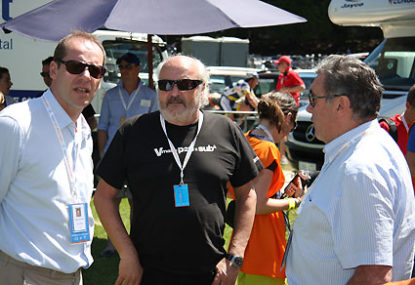'I've just won a stage of the Tour de France, mate!': Hindley grabs yellow jersey as Aussie blows Tour apart
Australia's Jai Hindley has said he is "lost for words" after a shock stage victory at the Tour de France earned him the leader's…

For someone whose hopes were once crushed by a doping scandal, it’s perhaps treading a fine line asking Swiss entrepreneur Andy Rihs whether or not his lavish recruitment policy at BMC Racing amounts to a form of financial doping.
Already boasting a roster that included two former world champions in Alessandro Ballan and reigning Tour de France winner Cadel Evans, BMC swelled their ranks this winter with, amongst others, the arrival of yet another rainbow jersey in Thor Hushovd and cycling’s hottest property, the all-conquering Belgian Philippe Gilbert.
Now Rihs is a self-confessed football man. The owner of Swiss football team Young Boys Bern, Rihs appreciates the nuances of the term ‘financial doping’ when I pose him the question at the recent Tour Down Under.
It’s a charge often levelled against teams such as Manchester City and Chelsea by Arsenal manager Arsene Wenger, who complains of the absence of a level playing field when having to compete against opposition extravagantly (not to mention recklessly) bankrolled by rich Arab sheikhs or mysterious Russian oligarchs.
“We have a big, big, big difference here,” stresses Rihs, one of Europe’s most successful businessmen and the man in charge of the Swiss Phonak team when Floyd Landis’s positive result for testosterone just days after winning the 2006 Tour de France saw the whole project implode.
“Cycling is poor whereas football is rich. BMC is a big team but our budget would be nothing for a soccer team. Soccer has TV coverage and gets a lot of income from it. But cycling has nothing. The money is so small.”
Where the European Champions League can pay out a total of €1.5bn to its participants, the total TV money in cycling is under €20m says Rihs, “and that goes to the organisers”.
“And so cycling relies on good sponsors,” he explains. And although a passionate cycling fan, as owner of BMC his interest in the team will always be primarily a commercial one.
This is why Rihs feels the situation at BMC differs from that at some high-end football clubs. While oil-rich duo Sheikh Mansour and Roman Abramovich essentially see their football clubs as hobbies, for Rihs BMC Racing will always be a business – and for the business to thrive, there has to be a forward-looking plan.
“It’s not just an egocentric dream of mine to have a strong team,” says Rihs. “We are not just here for three or four years. We have to look to the future too – we have to promote the bicycle in five years but also 10 years.”
While Evans’s defence of his Tour de France crown is a priority, it is not the team’s raison d’etre – hence BMC’s expansive recruitment drive, which includes the arrival of young Americans Tejay van Garderen and, last year, Taylor Phinney.
“We’re building up a whole portfolio,” says Rihs. “Tejay is a future GC rider and Taylor is a time trial specialist. We looked at our roster this summer and saw that we had strong spots and weaker spots. We try to fill those weak spots with stronger riders to make the team more regular so that you’re not depending on just one person. We want to have several cards to play.
“We detected several areas where we have to improve. One is classics because we want to win the classics and that is one of our big targets. The others are stages – we’re not really a sprinter team and we want to win things.
“Cadel not chasing the GC from the first day, so there will be scope. Thor and Philippe fitted well in this area because they can both win the classics and they can both win stages.”
I understand completely what Rihs is telling me and there’s no denying that it’s a worthwhile, ambitious and exciting project. As a cycling fan, I’m intrigued to see how BMC do, whether or not it will be a case of too-many-cooks-spoil-the-broth or if we’ll see a new dominant force emerging in the wake of HTC-Highroad’s demise.
But while Rihs is clearly right in underlining the financial differences between cycling teams and football teams, I’m not entirely convinced by his handling of the ‘financial doping’ bombshell.
By concentrating on the football side of things, Rihs is brushing aside the real problem for he fails to admit to the growing financial discrepancy between rival teams at both ProTour and Continental Pro level.
It’s all very well stressing the BMC’s salary is small compared to that of a top football team, but let’s get thing straight: the “poor” team still has ample funds in its coffers to pay the huge salaries for not just one gala rider, but three – in Evans, Gilbert and Hushovd.
Take French minnows Europcar, for instance. On the back of Thomas Voeckler’s stellar Tour de France, manager Jean-Rene Bernaudeau was keen to bring in Hushovd from Garmin-Cervelo but simply couldn’t afford the Norwegian’s wages. Financially secure BMC stepped in without too much ado, increasing their former world champion count to three.
So, it’s not just that BMC have yet another strong rider in their already impressive roster; it’s that a smaller team are denied the services of the kind of rider who could have benefited them on both a sporting and (in the long run) commercial plane.
In an era when cycling’s most successful stage racing team – HTC-Highroad – goes bust because it can’t find a new sponsor to help keep paying the contracts of its riders, it’s a worrying phenomenon that the gulf between the haves and have-nots seems to be increasing.